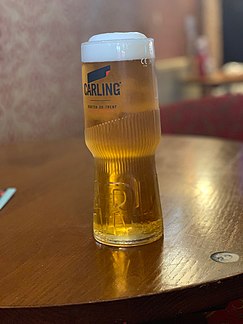Nice Carling Black Label Mirror
50cm x 42cm Sneem Co Kerry
Even though Carling originated in Canada,it’s popularity spread widely throughout the Commonwealth including Ireland .A famous advertising campaign “I bet he drinks Carling” contributed hugely to the brands market share .
Carling Black Label is a
Canadian brand of
lagerdistributed by
Carling Brewing Company. In several countries, it is also known as Carling Black Label, and in Sweden, it is known as Carling Premier. In the
United Kingdom it is now known as just Carling.
History
Although its original focus was on
ale, Carling has been brewing lager-style beers since the 1870s. In 1927, as part of an overall corporate re-branding effort under new president J. Innes Carling, the company renamed its already popular Black & White Lager to Black Label.
Three years later, Carling was purchased by
Toronto business tycoon
E. P. Taylor, who merged the company into his
Canadian Breweries Limited (CBL), which grew to be the world's largest brewing company, at least for a time. Under Taylor, Black Label was promoted as CBL's
flagship brand and went on to become the world's first beer to be brewed on a mass international scale,
becoming particularly popular in Commonwealth countries such as the United Kingdom, Australia, New Zealand and South Africa.
Canada
In response to a shift in popular taste away from ale, Carling added a three-storey lager plant to their main
London, Ontario, brewery in 1877.
Carling's Lager (later renamed Carling's Bavarian Stock Lager, and then Carling's Imperial Club Lager) was the company's first lager brand. Carling's Black & White Lager was introduced in the 1920s and later renamed Black Label Lager, in contrast to their recently launched Red Cap Ale.
Due to its strength and price, the brand quickly became popular with the country's working class, perhaps most famously among the
loggers and
miners of
Northern Ontario, where the brand gained a tough,
blue-collar image.
Around 1990, Black Label had an advertising campaign in Canada, which used the phrase "The Legend is Black."
United States

Brewing Corporation of America of Cleveland, Ohio in 1965. Home of Carling Black Label lager and Carling Red Cap Ale and former site the Peerless Motor Car Company
After the repeal of
prohibition in 1933, the
Peerless Motor Car Company, looking for a way to diversify in the poor car market of the
depression, purchased the American rights to Carling's formulas, identifying labels, and
trademarks. Technicians and
brewmasters were sent from Canada to convert a Peerless plant in
Cleveland,
Ohio, into the Brewing Corporation of America. They first tried just brewing Carling's Red Cap Ale, but sales were too slow to maintain the brewery, and sales didn't climb until the introduction of Black Label lager. The philosophy behind Black Label was to have a high quality lager that was available nationwide but with a locally brewed budget price. The strategy worked, and the next several decades led to rapid growth and expansion for the brewery and the Carling Black Label brand.
When Carling stopped producing Black Label to focus on a more profitable lager, they found their sales plummeting. Carling re-introduced Black Label with a beautiful blonde named Mabel, portrayed by Jeanne Goodspeed, with the slogan "Hey Mabel, Black Label!". The twenty-year marketing campaign cemented the name in the popular culture of America.
In 1979, after several years of intense pressure from the larger American Brewers
Miller and
Anheuser-Busch, Carling-National was bought out by the
Heileman Brewing Co. of
La Crosse, Wisconsin. Carling and the Black Label brand are currently owned by the
Molson Coors Brewing Company. Though no longer widely distributed in the U.S., Black Label remains the official beer of Beer Frisbee.
United Kingdom
Black Label was introduced to the United Kingdom in 1952. Originally, it was only available in bottles, but in 1965, The Hill Top in
Sheffield became the first pub to pour Carling Black Label draughts.
In the 1970s and 80s, Carling Black Label sales were driven to great heights, due partly to increased advertising support, in particular the classic "I bet he drinks" series of advertisements, and partly with the launch of Carling Black Label in cans. Cans were important to Carling's success as they helped open up the "take home" market.
[3]
The "I bet he drinks" series of ads showed someone doing something cool, clever or difficult, and having a bystander say "I bet he drinks Carling Black Label". With the help of this advertising campaign, it became Britain's best-selling brand of beer in 1971. In the 1980s, many of the adverts featured comedians
Mark Arden and
Stephen Frost, also known as
The Oblivion Boys, delivering the classic punchline. One of the advertisements in the series,
Dambusters from 1989, was a parody of the
1955 film of the same name, and was ranked at number 12 on
ITV's list of the "Best Ever Ads" in 2005,
and at number 17 on
Channel 4's list of the "
100 Greatest TV Ads" in 2000.
Campaign Live also ranked it at number 5 in their list of the "Top 10 Funniest TV Ads of All Time" in 2008.
Carling has remained Britain's best selling beer since 1985. 'Black Label' has been dropped from the brand name and logo in Britain since 1997.
South Africa
In South Africa, Black Label began to take on a different tone with the anti-
apartheid movement. This was partly due to the fact that, at 5.5%, it had more
alcohol than the other brands of beer that generally had 5.0%, as noted in the popular advertising catch phrase "only hard working students deserve an extra 0.5 percent."
Furthermore, the connotation of black to the racial issue became a point of pride to the native Africans. It used to be sold with the motto, "America's Lusty, Lively Beer", perhaps in reference to Canada, though it is seldom seen in the United States. The motto came from an older advertising campaign in the United States. Another famous
Afrikaans slogan for Black Label in South Africa is, "
Black Label sê die bybel", which means "The Bible says (one should drink) Black Label."
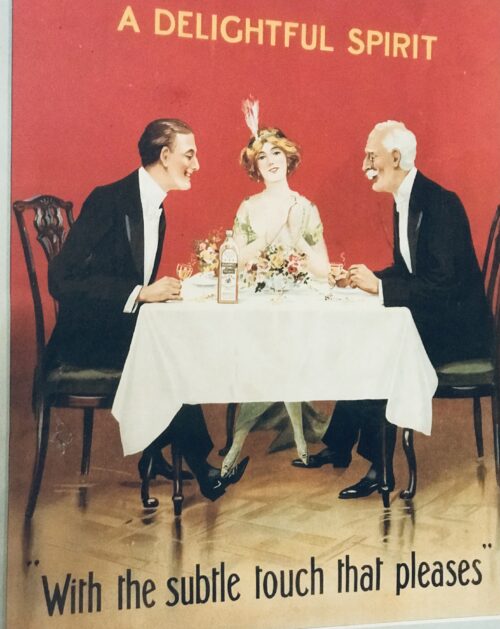
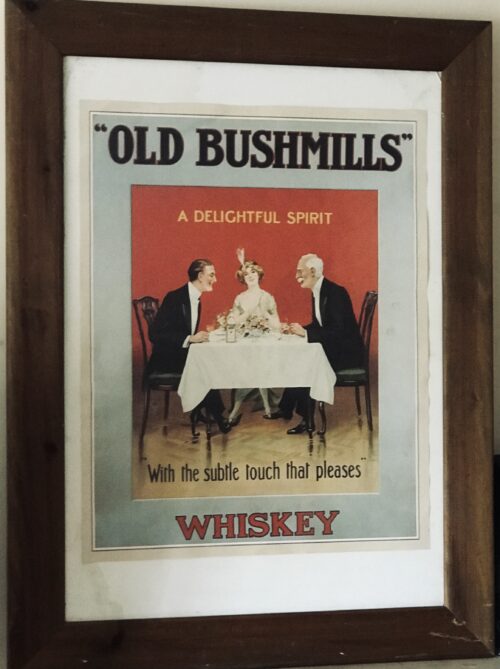 Classic Bushmills advertising print dating to the early part of the 20th century with magnificent, antique frame. 85cm x 70cm Belfast The Bushmills area has a long tradition with distillation. According to one story, as far back as 1276, an early settler called Sir Robert Savage of Ards, before defeating the Irish in battle, fortified his troops with "a mighty drop of acqua vitae". In 1608, a licence was granted to Sir Thomas Phillips (Irish adventurer) by King James I to distil whiskey. The Bushmills Old Distillery Company itself was not established until 1784 by Hugh Anderson. Bushmills suffered many lean years with numerous periods of closure with no record of the distillery being in operation in the official records both in 1802 and in 1822. In 1860 a Belfast spirit merchant named Jame McColgan and Patrick Corrigan bought the distillery; in 1880 they formed a limited company. In 1885, the original Bushmills buildings were destroyed by fire but the distillery was swiftly rebuilt. In 1890, a steamship owned and operated by the distillery, SS Bushmills, made its maiden voyage across the Atlantic to deliver Bushmills whiskey to America. It called at Philadelphiaand New York City before heading on to Singapore, Hong Kong, Shanghai and Yokohama.In the early 20th century, the U.S. was a very important market for Bushmills (and other Irish Whiskey producers). American Prohibition in 1920 came as a large blow to the Irish Whiskey industry, but Bushmills managed to survive. Wilson Boyd, Bushmills' director at the time, predicted the end of prohibition and had large stores of whiskey ready to export. After the Second World War, the distillery was bought by Isaac Wolfson, and, in 1972, it was taken over by Irish Distillers, meaning that Irish Distillers controlled the production of all Irish whiskey at the time. In June 1988, Irish Distillers was bought by French liquor group Pernod Ricard.In June 2005, the distillery was bought by Diageo for £200 million. Diageo have also announced a large advertising campaign in order to regain a market share for Bushmills.In May 2008, the Bank of Ireland issued a new series of sterling banknotes in Northern Ireland which all feature an illustration of the Old Bushmills Distillery on the obverse side, replacing the previous notes series which depicted Queen's University of Belfast. In November 2014 it was announced that Diageo had traded the Bushmills brand with Jose Cuervo in exchange for the 50% of the Don Julio brand of tequila that Diageo did not already own.
Classic Bushmills advertising print dating to the early part of the 20th century with magnificent, antique frame. 85cm x 70cm Belfast The Bushmills area has a long tradition with distillation. According to one story, as far back as 1276, an early settler called Sir Robert Savage of Ards, before defeating the Irish in battle, fortified his troops with "a mighty drop of acqua vitae". In 1608, a licence was granted to Sir Thomas Phillips (Irish adventurer) by King James I to distil whiskey. The Bushmills Old Distillery Company itself was not established until 1784 by Hugh Anderson. Bushmills suffered many lean years with numerous periods of closure with no record of the distillery being in operation in the official records both in 1802 and in 1822. In 1860 a Belfast spirit merchant named Jame McColgan and Patrick Corrigan bought the distillery; in 1880 they formed a limited company. In 1885, the original Bushmills buildings were destroyed by fire but the distillery was swiftly rebuilt. In 1890, a steamship owned and operated by the distillery, SS Bushmills, made its maiden voyage across the Atlantic to deliver Bushmills whiskey to America. It called at Philadelphiaand New York City before heading on to Singapore, Hong Kong, Shanghai and Yokohama.In the early 20th century, the U.S. was a very important market for Bushmills (and other Irish Whiskey producers). American Prohibition in 1920 came as a large blow to the Irish Whiskey industry, but Bushmills managed to survive. Wilson Boyd, Bushmills' director at the time, predicted the end of prohibition and had large stores of whiskey ready to export. After the Second World War, the distillery was bought by Isaac Wolfson, and, in 1972, it was taken over by Irish Distillers, meaning that Irish Distillers controlled the production of all Irish whiskey at the time. In June 1988, Irish Distillers was bought by French liquor group Pernod Ricard.In June 2005, the distillery was bought by Diageo for £200 million. Diageo have also announced a large advertising campaign in order to regain a market share for Bushmills.In May 2008, the Bank of Ireland issued a new series of sterling banknotes in Northern Ireland which all feature an illustration of the Old Bushmills Distillery on the obverse side, replacing the previous notes series which depicted Queen's University of Belfast. In November 2014 it was announced that Diageo had traded the Bushmills brand with Jose Cuervo in exchange for the 50% of the Don Julio brand of tequila that Diageo did not already own.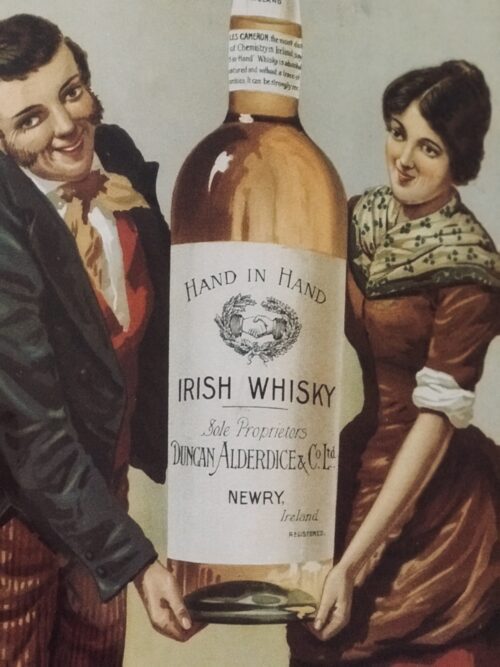
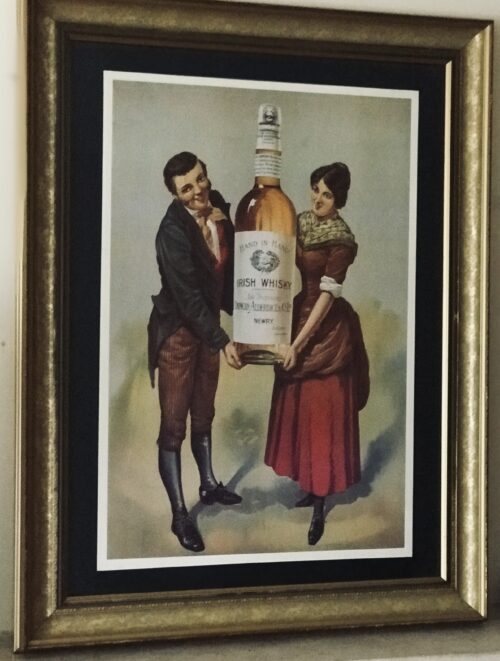 80cm x 63cm. Newry Co Down Newry Co Down was synonymous with distilling until the business sadly and steadily died a commercial death.Now a local businessman Michael McKeown has acquired the old distillery site on Monaghan Street in February this year, the original location of D’Arcy’s Old Irish Whiskey since 1817 as well as many other brands over the centuries, including Duncan Alderdice & C0. Speaking at a press conference last week, McKeown said he had resurrected the title of Matthew D’Arcy & Company to honour the last distiller who occupied the site.The history of the site dates back to 1575 with research claiming that the tradition of distilling was said to have begun in the Cistercian Monastery which preceded the town of Newry. The distillery is thought to be a contender for the oldest distillery in Ireland.The distilling businesses operating in Newry before 1800 were Chapman, D’arcy, Caulfield and Thompson as well as Duncan Alderdice & Co as featured in the charming print here from the early 1890s.Chapman put his working distillery up for sale in 1802 and it is known that in 1817 all of these other parties were acting in partnership on two sites in Newry with the premises on Monaghan Street being one of those original sites. Plans for the site include the restoration of the 19th century buildings with the addition of a working distillery, a visitor’s centre, restaurant, theatre and a Victorian pub.The company aim to produce around 9000 cases per year of Old Newry single malt whiskey and to retain stocks for at least 10 years.McKeown has also registered the brand names from previous occupants of the site, such as Duncan, Alderdice & Company. The brands include The Blackthorn, The Native, Hand-in-Hand and Killeavy Cream.The distillery plans to be an “important” stop on the Irish Whiskey Trail currently being developed by Tourism Ireland, due to its location half-way between Belfast and Dublin.The distillery, which will provide a number of new jobs, is also looking to recruit a master distiller.
80cm x 63cm. Newry Co Down Newry Co Down was synonymous with distilling until the business sadly and steadily died a commercial death.Now a local businessman Michael McKeown has acquired the old distillery site on Monaghan Street in February this year, the original location of D’Arcy’s Old Irish Whiskey since 1817 as well as many other brands over the centuries, including Duncan Alderdice & C0. Speaking at a press conference last week, McKeown said he had resurrected the title of Matthew D’Arcy & Company to honour the last distiller who occupied the site.The history of the site dates back to 1575 with research claiming that the tradition of distilling was said to have begun in the Cistercian Monastery which preceded the town of Newry. The distillery is thought to be a contender for the oldest distillery in Ireland.The distilling businesses operating in Newry before 1800 were Chapman, D’arcy, Caulfield and Thompson as well as Duncan Alderdice & Co as featured in the charming print here from the early 1890s.Chapman put his working distillery up for sale in 1802 and it is known that in 1817 all of these other parties were acting in partnership on two sites in Newry with the premises on Monaghan Street being one of those original sites. Plans for the site include the restoration of the 19th century buildings with the addition of a working distillery, a visitor’s centre, restaurant, theatre and a Victorian pub.The company aim to produce around 9000 cases per year of Old Newry single malt whiskey and to retain stocks for at least 10 years.McKeown has also registered the brand names from previous occupants of the site, such as Duncan, Alderdice & Company. The brands include The Blackthorn, The Native, Hand-in-Hand and Killeavy Cream.The distillery plans to be an “important” stop on the Irish Whiskey Trail currently being developed by Tourism Ireland, due to its location half-way between Belfast and Dublin.The distillery, which will provide a number of new jobs, is also looking to recruit a master distiller.
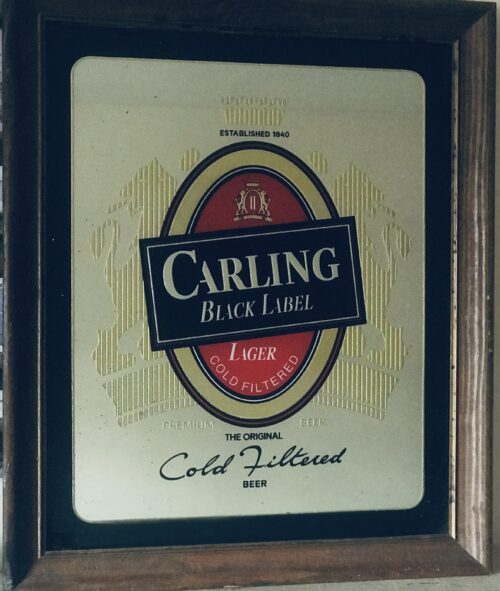 Nice Carling Black Label Mirror 50cm x 42cm Sneem Co Kerry Even though Carling originated in Canada,it’s popularity spread widely throughout the Commonwealth including Ireland .A famous advertising campaign “I bet he drinks Carling” contributed hugely to the brands market share . Carling Black Label is a Canadian brand of lagerdistributed by Carling Brewing Company. In several countries, it is also known as Carling Black Label, and in Sweden, it is known as Carling Premier. In the United Kingdom it is now known as just Carling.
Nice Carling Black Label Mirror 50cm x 42cm Sneem Co Kerry Even though Carling originated in Canada,it’s popularity spread widely throughout the Commonwealth including Ireland .A famous advertising campaign “I bet he drinks Carling” contributed hugely to the brands market share . Carling Black Label is a Canadian brand of lagerdistributed by Carling Brewing Company. In several countries, it is also known as Carling Black Label, and in Sweden, it is known as Carling Premier. In the United Kingdom it is now known as just Carling. Carling Black Label sign on a club in Pontefract, West Yorkshire.
Carling Black Label sign on a club in Pontefract, West Yorkshire. SABMiller variants of Black Label
SABMiller variants of Black Label


